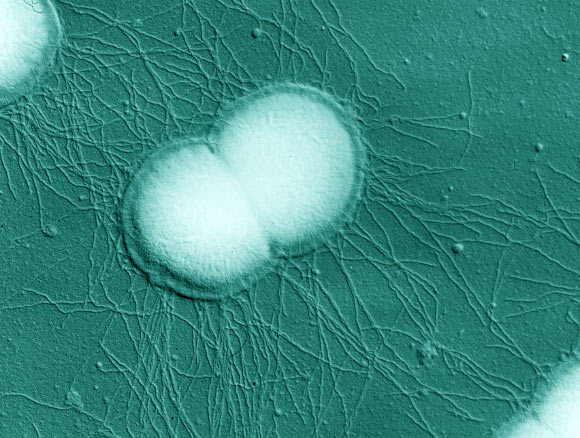According to a study reported in the Journal of Infectious Diseases, a new gonorrhea treatment has successfully eliminated gonococcal infection from female mice and prevented reinfection.

This scanning electron micrograph shows Neisseria gonorrhoeae diplococci. Image credit: Charles Brinton / National Institutes of Health.
More than 100 million new gonococcal infections occur each year around the globe, according to the World Health Organization. The infection can be asymptomatic but it also can cause extremely painful urination in men and pelvic inflammatory disease, which can lead to infertility and ectopic pregnancy, in women. It may also make individuals more susceptible to infection with HIV/AIDS.
“We developed the concept that gonococcal infection seems to inhibit specific adaptive immune responses, which is, in part, why people can become infected with it multiple times. It turns out that gonococcal infection very cleverly controls the immune system, inducing responses the bacterium can fight and suppressing the responses that it cannot fight,” said study senior author Prof Michael Russell of the University at Buffalo.
In considering how to modify the immune response to gonococcal infection, Prof Russell became intrigued with an anti-cancer therapy being developed by Prof Nejat Egilmez, also from the University at Buffalo.
Prof Egilmez, co-author of the current study, developed a sustained-release nanoparticle treatment that uses Interleukin-12, a cytokine or protein that helps stimulate an immune response against tumors that normally suppress immunity.
“We had the idea that maybe these IL-12 microspheres that they were developing against tumors could be used to generate an immune response against gonococcal infection as well. This research proves that they can,” Prof Russell said.
The current study describes how the IL-12 microspheres, administered intravaginally in mice, resulted in the development of a specific adaptive immune response – development of antibodies specific to Neisseria gonorrhoeae – and clearance of the infection within days.
One month later, attempts to reinfect these mice with the bacterium failed, demonstrating that the animals had retained the ability to fight reinfection.
“With this treatment, we have reversed the immunosuppression that gonococcal infection normally causes and allowed an effective immune response to develop. It could be argued that when the IL-12 microspheres are administered this way, they serve as an adjuvant that, in effect, converts the gonococcal infection into a live vaccine, thus essentially vaccinating the very population that is at risk for repeat infections,” Prof Russell said.
“And because it may circumvent the growing resistance of this bacterium and others to antibiotics, this treatment method also may open up new approaches for the development of non-resistant treatments for other infectious diseases.”
______
Bibliographic information: Yingru Liu et al. Enhancement of Adaptive Immunity to Neisseria gonorrhoeae by Local Intravaginal Administration of Microencapsulated Interleukin 12. J Infect Dis., published online September 18, 2013; doi: 10.1093/infdis/jit354







